arthritis support
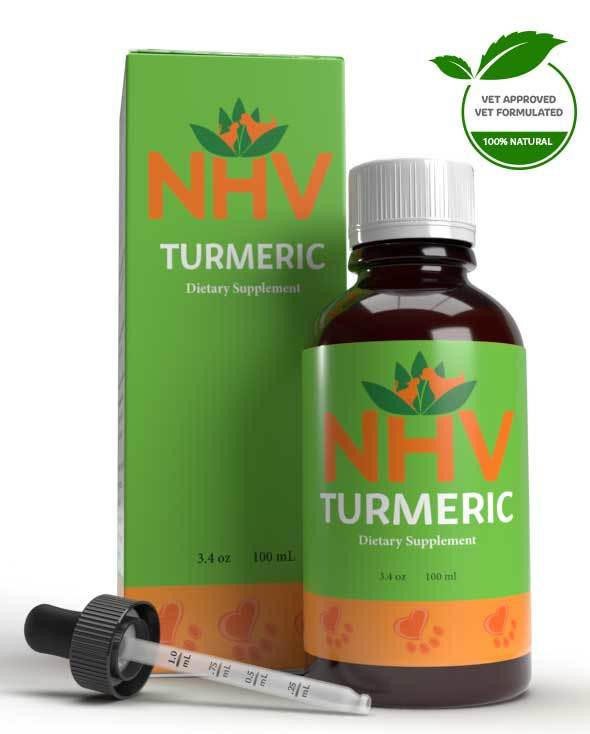
free shipping over $100 (USA & Canada)
1-877-937-4372 the pet expert hotline
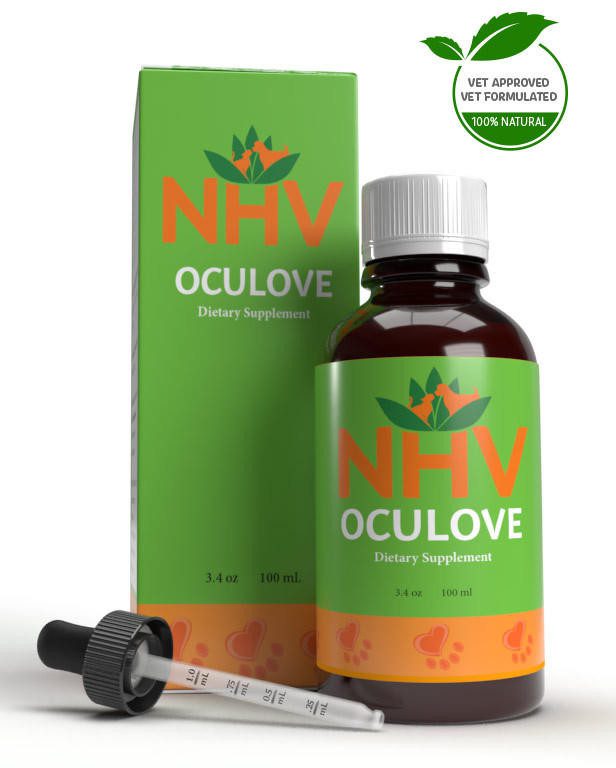

Cherry eye is a disorder that affects the third eyelid, also known as a nictitating membrane (NM). In this disorder, the gland of the third eyelid thickens and slips out of its proper place. This results in a red, swollen mass sticking out of the edge of the membrane, next to the lower eyelid. The third eyelid gland contributes to 30-50% of tear production. It has a protective function by releasing immunoglobulins (a protein that possesses antibody activity) to the eyelid, protecting it from infections.
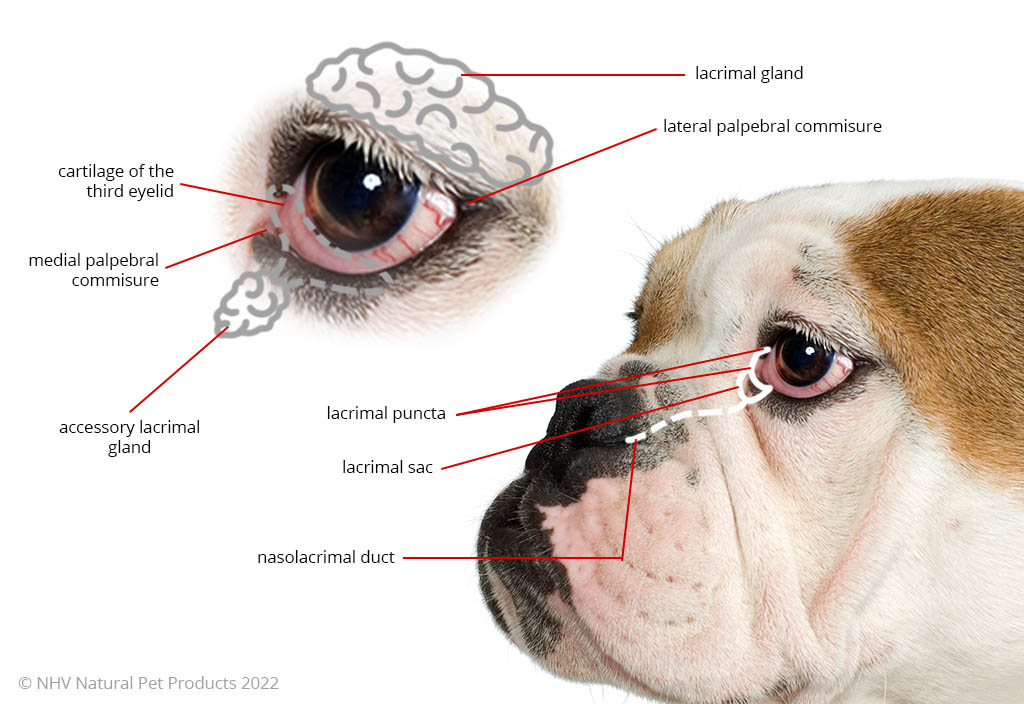
Cherry eye in dogs and cats is a genetic disorder. The exact cause is still unknown.
Young dogs, brachycephalic (smushy-faced) breeds, and toy or teacup varieties are prone to cherry eye. American Cocker Spaniels, Lhasa Apsos, Beagles, Pekingese, and English Bulldogs are at higher risk for this condition.
It is less common in cats than in dogs, however, some flat-faced breeds such as Burmese, Himalayans, and Persians, are prone to this condition.
As cherry eye is a genetic condition, there are no known preventative measures to avoid it.
Depending on the severity of the cherry eye, treatment may not be necessary. When it is first diagnosed, your veterinarian may recommend anti-inflammatory eye drops to help reduce the swelling. If there is discharge or signs of a bacterial infection, your vet may also prescribe an antibiotic eye medication. However, if it is chronic and is causing problems for your pet, your veterinarian may recommend surgery to preserve the eyelid.
Supplements with anti-inflammatory and antibacterial properties may help.
Supplements with anti-inflammatory and antibacterial properties may help pets suffering from this condition. Here are some supplements that I recommend:
OcuLove is our oral supplement formulated specifically to support eye health from the inside out. It contains herbs that have anti-inflammatory and infection-fighting properties. Some of the herbs are also known to have antioxidants properties and promote circulation around the eye.
Turmeric supports circulation around the eyes and is also rich in antioxidants, anti-inflammatory, and antibacterial properties.
Stimmune contains herbs with antibiotic-like properties that help fight infections caused by bacteria. It is a natural aid to promote healthy immune function and help with allergy symptoms. Stimmune also contains anti-inflammatory properties that may help decrease inflammation caused by irritation of the third eyelid.
If you have any questions about cherry eye, your pet’s health, or how herbal supplement can help, let us know! Contact our team of pet experts now by clicking the button below.
arthritis support

For Arthritis and Cancer Support
buy 2 and save $3
3 month supply for a small to medium size
Dogs love to root around in the dirt for goodies. But did you know one of the best things they could find would be turmeric? Turmeric for Dogs is a natural, antioxidant-rich supplement that supports your pup’s overall wellness.
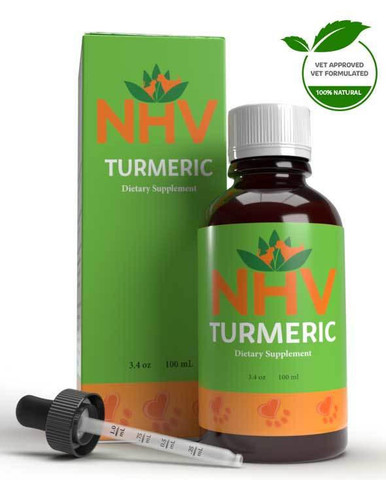
Dogs love to root around in the dirt for goodies. But did you know one of the best things they could find would be turmeric? Turmeric for Dogs is a natural, antioxidant-rich supplement that supports your pup’s overall wellness.
Sadly, your pup won’t find turmeric in their backyards unless you live in the tropics, where this amazing plant grows. However, they can benefit from this golden plant by taking a full-spectrum extract of Turmeric for Dogs.
Is turmeric good for dogs? Yes, most pups can use this safe and gentle herb for a number of health concerns. This is thanks to the organic compounds produced by the plant.
If you’re the pet parent of a sick pup, you might have a challenging journey ahead. Remember that love you feel for your dog will also play a big role, and if you need a little advice, our pet experts are here for you and can be reached by chat.
How does this incredible spice work? Turmeric is rich in antioxidants, which can help your precious pet with stress, pollution, and illness. In the body, Turmeric has the potential to help with both overall.
Pets that are sick have increased oxidation, so the antioxidants they get from food, medication, or supplements can help give them the extra they need.
As pet-parents ourselves, we know you only want the best for your pup. That’s why our extracts are made from human-grade, high quality ingredients. And when you choose NHV Turmeric, you’re choosing decades of holistic pet wellness experience from vets and herbalists who can help support your pet’s wellness journey. Our formula is:
Our turmeric was formulated by a master herbalist and holistic vet. Learn more about Dr. Hillary Cook’s use of turmeric and its benefits for pet health. We are also proud to have been a part of many dog success stories, like with our doggo friend, Captain Morgan.
Captain Morgan’s story: “Our bloodhound has been on turmeric for 2 months now. He has been getting up and down more smoothly and not as stiff in his backend. He loves the taste and we love how it has helped him
You can add daily supplements like Turmeric to top up your dog’s intake of natural, wellness-promoting ingredients. It can be given directly by mouth with the dropper provided, or it can be mixed into food or a favorite treat (this tip is dog-approved)!
All NHV supplements are made with the finest quality organic or ethically harvested herbs. We use non-GMO vegetable glycerin as our base. NHV products are full-spectrum extracts.
Select your pet's weight to determine the correct dose.
To be taken twice daily. Determine your pet’s weight and then use the easy chart below to determine the correct dose. This is the minimum dosage.
Pet's Weight Dosage
0 - 15 lb = 0.5 ml
16 - 30 lb = 1.0 ml
31 - 45 lb = 1.5 ml
46 - 60 lb = 2.0 ml
61 - 75 lb = 2.5 ml
Over 75 lb = 3.0 ml
How to Administer
Shake well before use. The easiest method is to use the dropper provide and places the drops into your pet’s food or favorite treat. You can also use the dropper and squirt directly into the pet’s mouth.
Some pets can be finicky, if this occurs consider hiding the drops in foods most pet’s love such as fish, chicken or yogurt or a favorite treat. If your pet only eats dry food then soak a few kibbles at feeding time.
For Best Results
Herbal dietary supplements are beneficial to the health and wellbeing of your pet and are safe for long-term use. Every pet responds to natural herbal supplements differently, therefore it is important to be consistent and administer the product daily. Supplements generally take two to four weeks to take effect, however this will vary from one animal to the next.
Product Storage
All NHV Natural Pet Products are pure herbal extracts and contain no artificial additives, preservatives or coloring. Shelf life after opening is 6 months and must be refrigerated after opening.
Cautions and Contraindications: Do not use Turmeric in pregnant or nursing animals. Speak to your vet before using our products. A second visit is recommended if your pet’s condition does not improve, or deteriorates after continued use of the supplements.
Sadly, your pup won’t find turmeric in their backyards unless you live in the tropics, where this amazing plant grows. However, they can benefit from this golden plant by taking a full-spectrum extract of Turmeric for Dogs.
Is turmeric good for dogs? Yes, most pups can use this safe and gentle herb for a number of health concerns. This is thanks to the organic compounds produced by the plant.
If you’re the pet parent of a sick pup, you might have a challenging journey ahead. Remember that love you feel for your dog will also play a big role, and if you need a little advice, our pet experts are here for you and can be reached by chat.
How does this incredible spice work? Turmeric is rich in antioxidants, which can help your precious pet with stress, pollution, and illness. In the body, Turmeric has the potential to help with both overall.
Pets that are sick have increased oxidation, so the antioxidants they get from food, medication, or supplements can help give them the extra they need.
As pet-parents ourselves, we know you only want the best for your pup. That’s why our extracts are made from human-grade, high quality ingredients. And when you choose NHV Turmeric, you’re choosing decades of holistic pet wellness experience from vets and herbalists who can help support your pet’s wellness journey. Our formula is:
Our turmeric was formulated by a master herbalist and holistic vet. Learn more about Dr. Hillary Cook’s use of turmeric and its benefits for pet health. We are also proud to have been a part of many dog success stories, like with our doggo friend, Captain Morgan.
Captain Morgan’s story: “Our bloodhound has been on turmeric for 2 months now. He has been getting up and down more smoothly and not as stiff in his backend. He loves the taste and we love how it has helped him
You can add daily supplements like Turmeric to top up your dog’s intake of natural, wellness-promoting ingredients. It can be given directly by mouth with the dropper provided, or it can be mixed into food or a favorite treat (this tip is dog-approved)!
All NHV supplements are made with the finest quality organic or ethically harvested herbs. We use non-GMO vegetable glycerin as our base. NHV products are full-spectrum extracts.
Select your pet's weight to determine the correct dose.
To be taken twice daily. Determine your pet’s weight and then use the easy chart below to determine the correct dose. This is the minimum dosage.
Pet's Weight Dosage
0 - 15 lb = 0.5 ml
16 - 30 lb = 1.0 ml
31 - 45 lb = 1.5 ml
46 - 60 lb = 2.0 ml
61 - 75 lb = 2.5 ml
Over 75 lb = 3.0 ml
How to Administer
Shake well before use. The easiest method is to use the dropper provide and places the drops into your pet’s food or favorite treat. You can also use the dropper and squirt directly into the pet’s mouth.
Some pets can be finicky, if this occurs consider hiding the drops in foods most pet’s love such as fish, chicken or yogurt or a favorite treat. If your pet only eats dry food then soak a few kibbles at feeding time.
For Best Results
Herbal dietary supplements are beneficial to the health and wellbeing of your pet and are safe for long-term use. Every pet responds to natural herbal supplements differently, therefore it is important to be consistent and administer the product daily. Supplements generally take two to four weeks to take effect, however this will vary from one animal to the next.
Product Storage
All NHV Natural Pet Products are pure herbal extracts and contain no artificial additives, preservatives or coloring. Shelf life after opening is 6 months and must be refrigerated after opening.
Cautions and Contraindications: Do not use Turmeric in pregnant or nursing animals. Speak to your vet before using our products. A second visit is recommended if your pet’s condition does not improve, or deteriorates after continued use of the supplements.
immune & allergy support
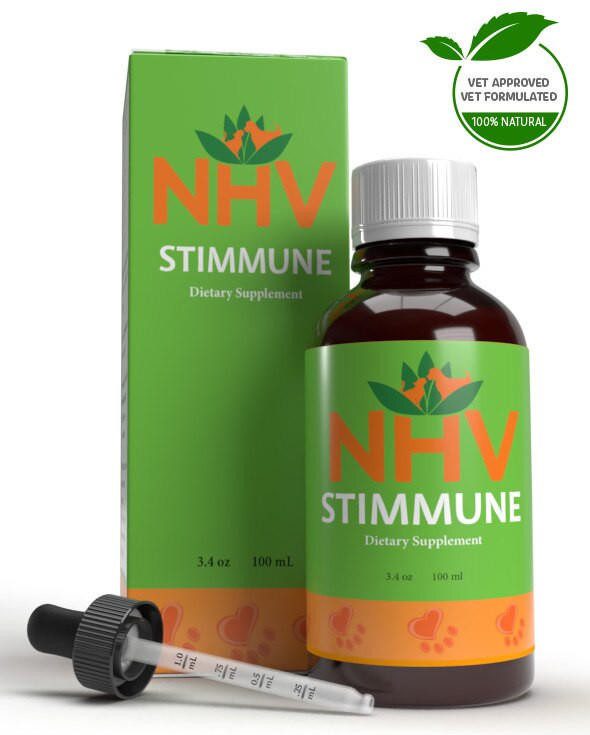
Natural Dog Food Allergy Supplement and Immune Support.
buy 2 and save $3
3 month supply for a small to medium size
Soothes food allergies, skin allergies (dermatitis), and infection. Helps relieve a variety of symptoms related to allergies. Supports a healthy balance of the immune system in pets with conditions such as autoimmune disease.

Soothes food allergies, skin allergies (dermatitis), and infection. Helps relieve a variety of symptoms related to allergies. Supports a healthy balance of the immune system in pets with conditions such as autoimmune disease.
Stimmune helps balance the immune system and helps ease allergy symptoms that can make your dog miserable. Stimmune is an all-natural, vet-formulated dog allergy immune supplement that will help your pet deal with dog food allergies as well as other immune related disorders.
Stimmune can provide dog allergy help with allergic reactions related to food, as well as environmental allergies including reactions to fleas, insect bites, food and other environmental factors. For more acute seasonal or environmental allergies, please try Alge-Ex for a remedy specifically formulated for your dog.
An allergy is an overreaction of the immune system to a normally harmless substance called an antigen. Allergies in dogs often occur when allergens are inhaled, ingested, or absorbed by the body. When this occurs, the immune system becomes over-reactive to substances it believes are harmful. This reaction causes a release of histamine, causing the common allergy symptoms in your pet.
The cause of allergies in dogs can be difficult to determine. While it is always best to eliminate the cause altogether, like omitting a specific food from their diet, some causes can be nearly impossible to totally eradicate, like dust mites or pollen. This is where a dog allergy supplement that is taken daily can help relieve your loved one of common allergens, even when you're not exactly sure what they are allergic to.
Dog food allergy support is close at hand with Stimmune added into your pet’s daily regimen. This 100% natural herbal supplement was formulated by a holistic veterinarian to comprehensively care for your pet’s health.
Explore our Pet Expert Q&A to ask questions about your pet’s allergic reactions or view questions that other concerned pet owners like you have posted. Or, visit our blog to learn how to prevent food allergies in dogs and cats.
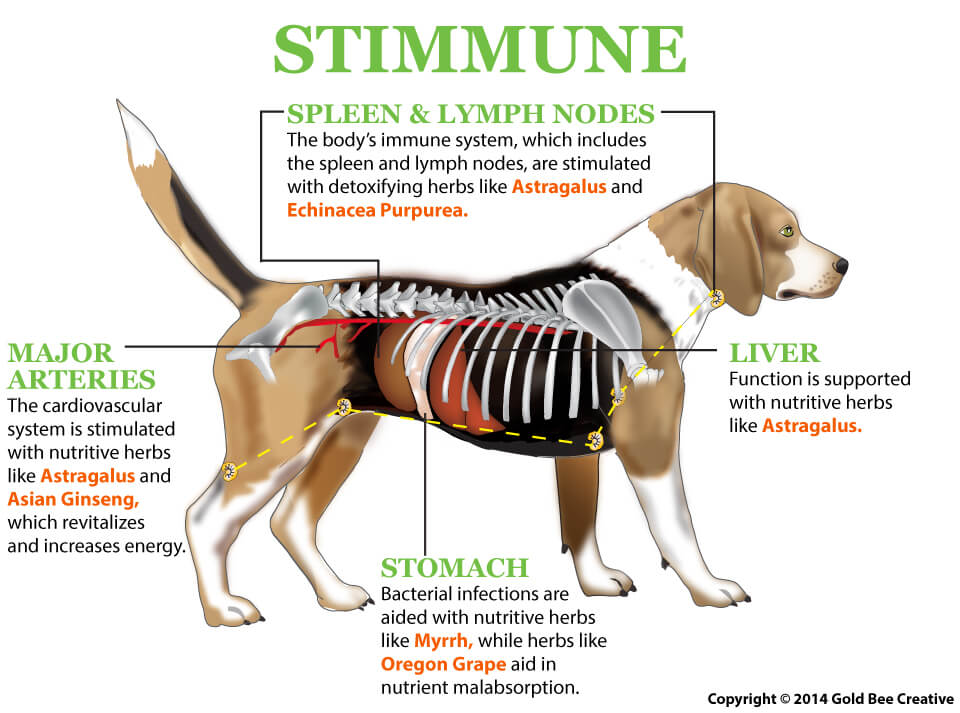
Astragalus – Stimulates liver function and helps balance the immune system. High in antioxidants it also helps protect against oxidative damage.
Echinacea Purpurea – Reduces inflammation, helps boost the immune system and efficiently fights infection.
Oregon Grape – Has antibiotic, anti-inflammatory and immunostimulatory properties.
Asian Ginseng – Has been used for thousands of years to help against various health issues. This antioxidant herb helps balance the immune system, helps the body fight infections and helps the body cope against stress.
Myrrh – An astringent that relieves irritated skin, Myrrh is high in anti-inflammatory and antioxidant effects.
Select your pet's weight to determine the correct dose.
To be taken twice daily. Determine your pet’s weight and then use the easy chart below to determine the correct dose. This is the minimum dosage.
Pet's Weight Dosage
0 - 15 lb = 0.5 ml
16 - 30 lb = 1.0 ml
31 - 45 lb = 1.5 ml
46 - 60 lb = 2.0 ml
61 - 75 lb = 2.5 ml
Over 75 lb = 3.0 ml
For small animals (rabbits, ferrets), avians and reptiles use 1 drop for every 2 lb of body weight.
How to Administer
Shake well before use. The easiest method is to use the dropper provide and places the drops into your pet’s food or favorite treat. You can also use the dropper and squirt directly into the pet’s mouth.
Some pets can be finicky, if this occurs consider hiding the drops in foods most pet’s love such as fish, chicken or yogurt or a favorite treat. If your pet only eats dry food then soak a few kibbles at feeding time.
For Best Results
Herbal dietary supplements are beneficial to the health and wellbeing of your pet and are safe for long-term use. Every pet responds to natural herbal supplements differently, therefore it is important to be consistent and administer the product daily. Supplements generally take two to four weeks to take effect, however this will vary from one animal to the next.
Product Storage
All NHV Natural Pet Products are pure herbal extracts and contain no artificial additives, preservatives or coloring. Shelf life after opening is 6 months and must be refrigerated after opening.
Cautions and Contraindications
Do not use Stimmune in pregnant or nursing animals. Speak to your vet before using our products. A second visit is recommended if your pet’s condition does not improve, or deteriorates after continued use of the supplements.
All information provided by NHV Natural Pet Products is for educational purposes only.
Stimmune helps balance the immune system and helps ease allergy symptoms that can make your dog miserable. Stimmune is an all-natural, vet-formulated dog allergy immune supplement that will help your pet deal with dog food allergies as well as other immune related disorders.
Stimmune can provide dog allergy help with allergic reactions related to food, as well as environmental allergies including reactions to fleas, insect bites, food and other environmental factors. For more acute seasonal or environmental allergies, please try Alge-Ex for a remedy specifically formulated for your dog.
An allergy is an overreaction of the immune system to a normally harmless substance called an antigen. Allergies in dogs often occur when allergens are inhaled, ingested, or absorbed by the body. When this occurs, the immune system becomes over-reactive to substances it believes are harmful. This reaction causes a release of histamine, causing the common allergy symptoms in your pet.
The cause of allergies in dogs can be difficult to determine. While it is always best to eliminate the cause altogether, like omitting a specific food from their diet, some causes can be nearly impossible to totally eradicate, like dust mites or pollen. This is where a dog allergy supplement that is taken daily can help relieve your loved one of common allergens, even when you're not exactly sure what they are allergic to.
Dog food allergy support is close at hand with Stimmune added into your pet’s daily regimen. This 100% natural herbal supplement was formulated by a holistic veterinarian to comprehensively care for your pet’s health.
Explore our Pet Expert Q&A to ask questions about your pet’s allergic reactions or view questions that other concerned pet owners like you have posted. Or, visit our blog to learn how to prevent food allergies in dogs and cats.

Astragalus – Stimulates liver function and helps balance the immune system. High in antioxidants it also helps protect against oxidative damage.
Echinacea Purpurea – Reduces inflammation, helps boost the immune system and efficiently fights infection.
Oregon Grape – Has antibiotic, anti-inflammatory and immunostimulatory properties.
Asian Ginseng – Has been used for thousands of years to help against various health issues. This antioxidant herb helps balance the immune system, helps the body fight infections and helps the body cope against stress.
Myrrh – An astringent that relieves irritated skin, Myrrh is high in anti-inflammatory and antioxidant effects.
Select your pet's weight to determine the correct dose.
To be taken twice daily. Determine your pet’s weight and then use the easy chart below to determine the correct dose. This is the minimum dosage.
Pet's Weight Dosage
0 - 15 lb = 0.5 ml
16 - 30 lb = 1.0 ml
31 - 45 lb = 1.5 ml
46 - 60 lb = 2.0 ml
61 - 75 lb = 2.5 ml
Over 75 lb = 3.0 ml
For small animals (rabbits, ferrets), avians and reptiles use 1 drop for every 2 lb of body weight.
How to Administer
Shake well before use. The easiest method is to use the dropper provide and places the drops into your pet’s food or favorite treat. You can also use the dropper and squirt directly into the pet’s mouth.
Some pets can be finicky, if this occurs consider hiding the drops in foods most pet’s love such as fish, chicken or yogurt or a favorite treat. If your pet only eats dry food then soak a few kibbles at feeding time.
For Best Results
Herbal dietary supplements are beneficial to the health and wellbeing of your pet and are safe for long-term use. Every pet responds to natural herbal supplements differently, therefore it is important to be consistent and administer the product daily. Supplements generally take two to four weeks to take effect, however this will vary from one animal to the next.
Product Storage
All NHV Natural Pet Products are pure herbal extracts and contain no artificial additives, preservatives or coloring. Shelf life after opening is 6 months and must be refrigerated after opening.
Cautions and Contraindications
Do not use Stimmune in pregnant or nursing animals. Speak to your vet before using our products. A second visit is recommended if your pet’s condition does not improve, or deteriorates after continued use of the supplements.
All information provided by NHV Natural Pet Products is for educational purposes only.
Published: March 17, 2022